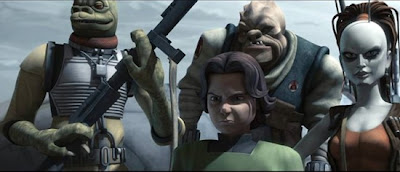 What's a mother-to-be to do when she finds out her baby daddy has been lying to her from the start of their relationship and, beyond that, he's not even human? Actress Lourdes Benedicto (ER/24), who plays Valerie Stevens on ABC's V, told us in an exclusive interview that everything her character has been going through will come to a head in tonight's episode, "Heretic's Fork."
What's a mother-to-be to do when she finds out her baby daddy has been lying to her from the start of their relationship and, beyond that, he's not even human? Actress Lourdes Benedicto (ER/24), who plays Valerie Stevens on ABC's V, told us in an exclusive interview that everything her character has been going through will come to a head in tonight's episode, "Heretic's Fork.""What happens in tonight's episode is the climax of the relationship between her and Ryan and is what the audience has been waiting for, 'cause the audience has known all along that Ryan is a V and he has been keeping it from her," said Benedicto. "She's going to find out the truth of many truths tomorrow night. I think that's going to be really exciting and seeing her have to make decisions and deal with those decisions and repercussions. It is a good episode."
One of those truths involves the fact that Ryan (Morris Chestnut) actually slipped Valerie phosphorus from the mothership that was needed to insure the survival of the baby hybrid ... a pregnancy that wasn't supposed to be possible. And the baby's growing at breakneck speed, and the ultrasound pics show a tail.
"She won't be able to go back from [what he did], no," said Benedicto.
Trust may be a hard thing to come by when Valerie discovers what he's done, she admitted. "It's a sci-fi show, but ultimately what's great about it is that it really focuses on and tries to deal with real human emotions and real human situations," she said.
According to Benedicto, while Valerie's innocence will be lost, she'll gain something else. "I think what's great about this situation is that we'll get to see her really take command of her own fate, as much as she can, and really become a part of her own destiny and decide what she's going to do with this baby. And is she going to forgive Ryan? Is she going to trust him again? We'll see her struggle with those choices, and we'll see her make those decisions and the repercussions of that. I think that's the beauty of it. That's what we really want to see with our characters is how they deal with everything that life throws at them—especially lizard babies," she said with a laugh.
In the promo for tonight's episode, when High Commander Anna (played by Morena Baccarin) discovers that the pregnancy exists, Anna orders that the human woman carrying the "mongrel" baby and the Visitor who impregnated her be found and dissected. Then Anna releases one of her new supersoldiers to go after them.
Yes. They're pretty badass. The stakes are getting higher for everybody ... all the characters, the stakes are getting higher. The life-and-death situations are getting a lot more real and scary. These soldiers, they mean business. And there's going to be some pretty cool special effects in this episode, too. So it should be really fun to watch," said Benedicto.
Something else that was fun to watch this season was pregnant Valerie's ravenous appetite and her reaction to a dead mouse. In what was likely a nod to the original series, where the Visitors downed rodents as snacks, Valerie sees the dead mouse in a trap, picks it up, and for just a moment we think she might eat it.
"My character has definitely been the one that plays a lot of homage to the original, being that she has the alien birth and then with the rat and everything. So it is kind of nice to serve that purpose. ... As far as doing the scene, I was really afraid they were going to use a rat, as opposed to a mouse, and that I don't know if I could have actually, physically picked it up without probably hyperventilating. So once they decided it was a small mouse and a little mouse, it was lot easier to shoot," said Benedicto with a laugh. "And I just sort of had to jump in with both feet and not think about it too much."
V airs on ABC on Tuesdays at 10 p.m. ET/PT.













